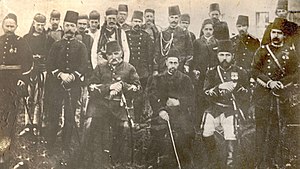Ali Pasha of Gusinje
Ali Šabanagić pasha of Gusinje | |
|---|---|
 Picture of Ali Pasha (sitting, first from the left) with Haxhi Zeka (sitting in the middle) and some other members of Prizren League | |
| Born | 1828 Gusinje, Ottoman Empire |
| Died | 1889 Peć, Ottoman Empire |
| Allegiance | |
| Years of service | 1845—1889 |
| Rank |
|
| Battles/wars | Battle of Novšiće |
Ali Beg Shabanagaj (1828–1889) ([Ali-paša Šabanagić, Али-паша Шабанагић] Error: {{Lang-xx}}: text has italic markup (help)) was an Albanian military commander and one of the leaders of the League of Prizren.[1][2][3] He ruled over an area in eastern Montenegro (then Ottoman Empire). He was more commonly known as Ali Pasha of Gusinje (Albanian: Ali Pashë Gucia, [Ali-paša Gusinjski, Али-паша Гусињски] Error: {{Lang-xx}}: text has italic markup (help)).[4][5] He was the leader of the Albanian troops of the League of Prizren against the Principality of Montenegro at the battle of Nokshiq.[6]
Biography
Ali was born in 1828 in Gusna (Gusinje), to landowner Hasan-bey Shabanagaj (Serbian: Šabanagić). He finished Turkish language school in medresa in Peć and military school in Istanbul. In 1845 Ali was appointed as kaymakam (sub-governor) of Gusinje, succeeding his father on this position.[7][8][9] In 1860's he supported the uprising of northern Albanian muslim tribes against Tanzimat reforms which reduced their privileged status.[9]
The League of Prizren was established with Ottoman support in 1878, after the Congress of Berlin decided to cede to Montenegro Albanian inhabited areas of Plav and Gusinje in modern Montenegro.[10] Ali Pasha was one of its founders and military commanders in the region of Plav and Gusinje. He was one of the commanders of irregulars mobilized by the League against the Montenegrin forces in the Battle of Novšiće and later against the forces of Ottoman Empire. In the early phases of the attack against Mehmed Ali Pasha he commanded the volunteer troops that blocked the routes from Đakovica to the Ottoman-Montenegrin border. He was also the leader of the Albanian troops of the League of Prizren against the Principality of Montenegro at the Battle of Novšiće.[11]
After the irregulars of the League of Prizren were crushed by the Ottomans in 1881, Ali Pasha of Gusinje was arrested.[12] He was released after the Sultan gave general amnesty and appointed on the position of mutesarrif of the Ottoman Sanjak of İpek because he did not object the Ottoman rule and maintained a close connection with the Porte throughout the conflict being more concerned to prevent Montenegro to capture Plav and Gusinje. In 1881, during his visit to Istanbul, he was promoted to the rank of beylerbey.[13]
Death
Ali Pasha was assassinated in the Rugova Canyon in 1889. According to some rumors, more radical Haxhi Zeka stood behind his murder.[9]
Lahuta e Malcis
In the Albanian national epic poem Lahuta e Malcis (English: Highland Lute) Ali Pasha of Gusinje is presented as a blazing hero and is the central figure of the 8th canto and one of the important figures of the 9th canto.[14]
References
- ^ http://books.google.al/books?id=8m07AAAAIAAJ&q=Ali+Pasha+of+Gusinje&dq=Ali+Pasha+of+Gusinje&hl=sq&sa=X&ei=9zB7VMD1NYjnygPS5YG4Dg&ved=0CD4Q6AEwBQ
- ^ http://books.google.al/books?id=d_58tQAACAAJ&dq=Ali+Pasha+of+Gusinje&hl=sq&sa=X&ei=9zB7VMD1NYjnygPS5YG4Dg&ved=0CBsQ6AEwAA
- ^ http://books.google.al/books?id=bnsITEI0l4IC&pg=PA288&dq=Ali+Pasha+of+Gusinje&hl=sq&sa=X&ei=9zB7VMD1NYjnygPS5YG4Dg&ved=0CFEQ6AEwCA#v=onepage&q=Ali%20Pasha%20of%20Gusinje&f=false
- ^ nekad i danas By Mihailo Maletić, Anton Berisha.
- ^ Zeitschrift für Balkanologie, Volumes 16-18
- ^ http://books.google.al/books?id=d_58tQAACAAJ&dq=Ali+Pasha+of+Gusinje&hl=sq&sa=X&ei=9zB7VMD1NYjnygPS5YG4Dg&ved=0CBsQ6AEwAA
- ^ Чупић, Никола (1898). Годишњица Николе Чупића. Штампа Државне штампарије Краљевине Југославије. p. 132.
- ^ Folklore macédonien. Institut za folklor. 1980. p. 65.
Али-паша Гусињски (Гусиња), понапрежен кајмакам и земјопосед- ник во Гусиње, а во ...
- ^ a b c Elsie, Robert (24 December 2012). A Biographical Dictionary of Albanian History. I.B.Tauris. p. 183. ISBN 978-1-78076-431-3.
- ^ http://books.google.al/books?id=d_58tQAACAAJ&dq=Ali+Pasha+of+Gusinje&hl=sq&sa=X&ei=9zB7VMD1NYjnygPS5YG4Dg&ved=0CBsQ6AEwAA
- ^ Zeitschrift für Balkanologie. R. Trofenik. 1983. p. 140.
- ^ Appletons' annual cyclopaedia and register of important events, Volume 9 page 764 [1]
- ^ Mikić, Đorđe (1988). Društvene i ekonomske prilike kosovskih srba u XIX i početkom XX veka. Srpska akademija nauka i umetnosti. p. 25.
Тако је вођ скадароког крила Лигиних снага Али-паша Гусињски, боравећи V Царнгр^лу 1881. годнне, добио чин беглербега
- ^ Fishta, Gjergj; Robert Elsie; Janice Mathie-Heck (2005). The highland lute: (Lahuta e malcís) : the Albanian national epic. Centre for Albanian Studies (London, England). I.B.Tauris. pp. 65–73. ISBN 1-84511-118-4.
